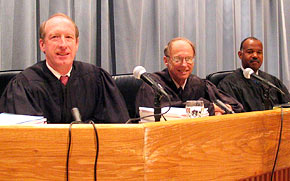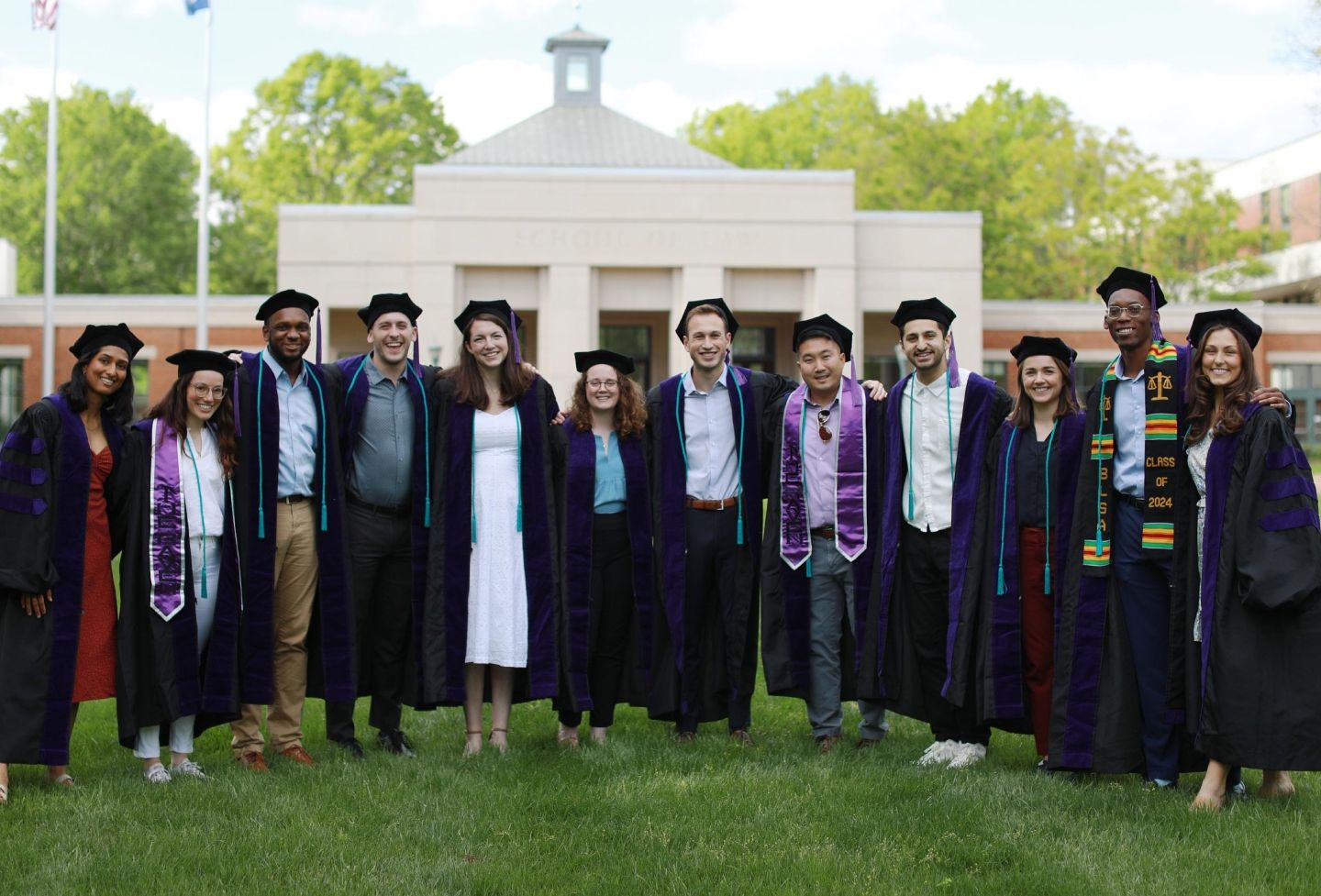Fourth Circuit Panel Hears Arguments at Law School

Law School students got a taste of what it's like to try a case at the appellate level Sept. 25, as a panel of the United States Court of Appeals for the Fourth Circuit heard oral arguments from three cases in Caplin Auditorium. Judges J. Harvie Wilkinson III, William B. Traxler Jr., and Roger L. Gregory heard cases involving the United States Postal Service, a contract dispute over a company asset sale, and a criminal fraud case.
A Fourth Circuit panel hears arguments before the Law School every three years, said Wilkinson, who added that he was "proud to have a school of this caliber in our circuit." In the appellate court, each side argues their case for a set time while also answering judges' questions, then appellants present a rebuttal. Just as in a regular session, the court clerk called the session together with "Oyez, Oyez" — except this time a sea of students and faculty rose at the call.
In Wickwire Gavin v. United States Postal Service, plaintiff's attorney David Hendel, representing T&S Products, argued that the Postal Service should not be able to keep secret revenues and losses on particular programs and how much they pay their private contractors. The law firm of Wickwire Gavin sued the Postal Service under the Freedom of Information Act to discover such figures about the "jiffy bag" program, to which T&S had lost a bid to Hallmark. Opposing counsel Steven Gordon, an assistant U.S. Attorney from the eastern district of Virginia, said Congress gave the Postal Service leave to follow "good business practices" under the ReadyPost Initiative, in order to better compete with private companies.
"It's never a good business practice to withhold …your revenue or loss on a program," Hendel argued.
Wilkinson fired back, "Where in the record below was evidence introduced that other businesses disclosed the information you are seeking in your request?" He later added, "That kind of evidence in the record would immensely help your case."
The postal service cannot explain how releasing this information would help any of its competition," Hendel complained. He noted that the same packaging the Postal Service was reselling was given away free in FedEx stores. Wilkinson said the argument "sounds a little bit like sour grapes."
"The Postal Service is acting in this particular instance as a business," Gordon counteracted. "Retailers generally do not release this type of information."
Traxler asked why disclosing the information would harm the Postal Service. Gordon responded that T&S sells itself as knowing the customer, and having access to such information would give them a competitive edge. He said brand names are important to the Postal Service, as well as making consistent products. But Wilkinson questioned whether the service was in effect preserving artificially high prices. "You can't hide your eyes to the fact that this is a government agency," he said.
Wilkinson described the second case, Energy Corporation of America v. MacKay Shields as more "technical." Appellants' attorney Mark. Pomerantz, arguing on behalf of the bondholders of Energy Corporation of America, said the case revolved around an "incorrect reading of a bond indenture." An ECA subsidiary sold the stock of natural gas distribution subsidiary Mountaineer Gas, grossing $225 million from the sale. According to Pomerantz, the bond indenture said if ECA sold an asset, it could reinvest profits back in the business, but if more than $10 million in proceeds are left at the end of the year, it must redeem the notes and pay off the bondholders. Pomerantz said that according to tax filings the company ended up with an excess of $40 million, paying only $39 million to the IRS. The dispute revolved around whether credits and deductions used by ECA in tax filings but unrelated to the sale could be deducted from net proceeds.
Wilkinson, who called the case "pretty close and difficult," questioned opposing counsel Tom Goodwin about his opposition to using the figures on ECA's tax returns to decide the case-"until [the appellant] sees that concrete manifestation of your dealings with the IRS, we won't know [the financial picture of the company]," Wilkinson said. Goodwin responded that the company's financial picture changes daily, and the company could, for example, have to pay more taxes on the sale in the future. Wilkinson teased out of Goodwin that if it were drafted now, the indenture's language would have been made clearer, perhaps offering more support to Goodwin's argument that the transaction itself should be isolated from the company's yearly proceeds. In his rebuttal Pomerantz noted that the language of the indenture refers to taxes paid or payable-and he alleged under the Court's precedents that that meant the figure used should be based on those in tax return filings.
In United States v. Stone, the appellants Stone and Yates were indicted on 12 counts of conspiracy to file false government claims, filing false government claims, accepting kickbacks, and filing false tax returns. Stone, an electrician, had allegedly asked government contractors at a General Services Administration federal complex in Maryland to inflate invoices and pay him the difference. One of the charged defendants, Fitzgerald, pled guilty and became a key witness for the prosecution, although he was mentally ill. Stone's attorney, Allen Howard Orenberg, said he should have been able to review Fitzgerald's medical record to prepare for his cross examination, and have his own psychiatrist evaluate him. Gregory challenged the contention that Fitzgerald's bipolar diagnosis hadn't been fully explored during the trial. "He has a psychosis. What else do you need? Two? Three?" Wilkinson said the witness's privacy was also at stake.
On another basis for appeal, both Orenberg and Yates' attorney, Robert Charles Bonsib, argued that their defendants' cases were so at odds that a jury had to believe one to convict the other, so should have been granted a severance that was denied in the district court trial. Yates testified against Stone during the trial, arguing that he had done nothing wrong.
"That slice of cases [where finger-pointing happens] is the type of cases where severance is required," Bonsib said. Wilkinson said district judges could decide whether such trials were fair, and pointed out that most joint trials, where defendants are tried together because of overlapping facts, have plenty of finger-pointing. If the court decided in the appellants favor, "this case will be thrown up at us for years," Wilkinson said. "The implications for joint trials are very serious."
In his cross-appeal, assistant U.S. attorney David Salem argued that the district court judge should not have reduced Yates' sentence because of his family problems. Yates had a history of depression and medication, and his son has physical and emotional handicaps. Mrs. Yates commuted two hours in the morning and afternoon to work and to pick up her son from school.
"The fact of the matter is, while his ruling is based on compassion, his ruling needs to be based on adequate factual record," Salem argued. He pointed to other cases of defendants with similar circumstances where the court did not reduce the sentence, including in single-parent households. Yates was primarily a breadwinner for the family, he said, and not a crucial social support to his son. "It's not enough to justify the departure."
Wilkinson asked, "Isn't there a way to light upon three or four especially poignant circumstances to limit the case? Is it possible to write a limiting opinion?" Salem said if Mrs. Yates had been convicted instead, a lighter sentence would have been appropriate. Gregory noted that many people who go to jail have families, and many don't have hundreds of thousands of dollars in assets to support them.
After hearing argument, the judges took questions from the audience. Responding to an inquiry about whether it was unusual that the appellate lawyers also tried the case, Traxler said it wasn't rare, and that in some cases it is preferable, because you can ask about events or decisions at the trial, and attorneys can't shrug off the question. But some trial lawyers are unused to the appellate court and argue like they are speaking to a jury, he added.
Gregory explained they panel usually discusses the cases immediately after the hearings. "The discussions will go on as papers [opinions] circulate or develop," he said.
Wilkinson added, "I like to do it that way because our recollections and impressions are freshest."
Founded in 1819, the University of Virginia School of Law is the second-oldest continuously operating law school in the nation. Consistently ranked among the top law schools, Virginia is a world-renowned training ground for distinguished lawyers and public servants, instilling in them a commitment to leadership, integrity and community service.


